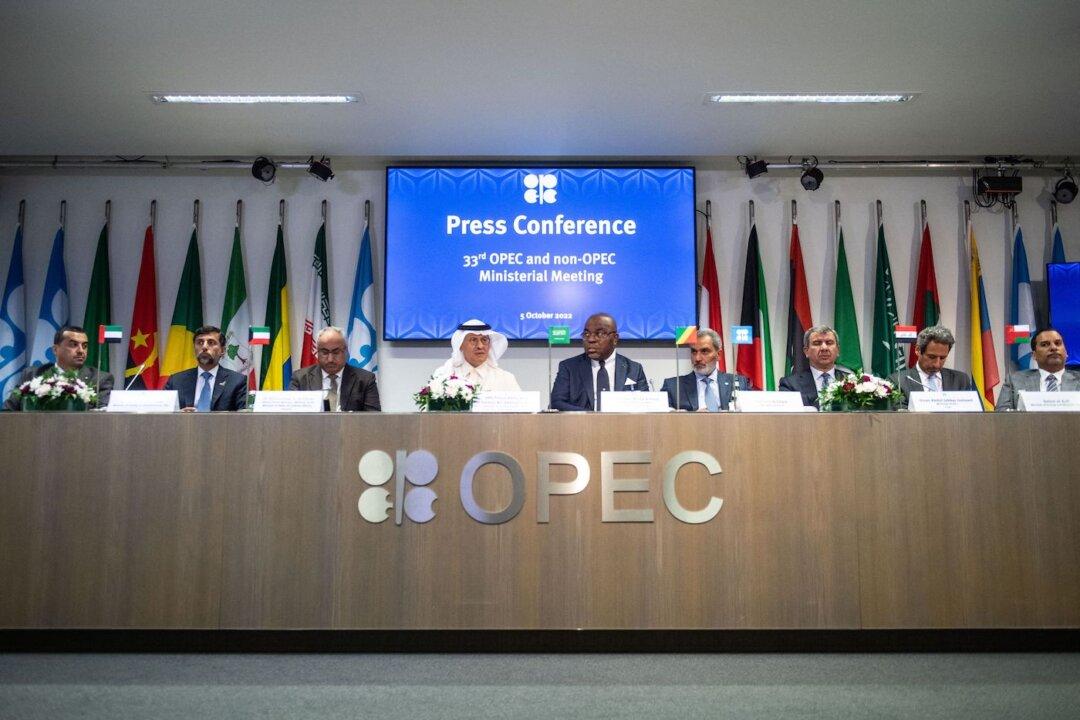The latest production cut announced by the OPEC+ oil cartel brings to light vulnerabilities but also opportunities in North American energy policy. Canada faces higher inflation as its dollar remains weak despite the rise in the price of oil, while the United States continues to draw on emergency resources though this is expected to wind down.
The cartel, formed by the 14-member Organization of the Petroleum Exporting Countries (OPEC) and 10 other oil-exporting countries, agreed on Oct. 5 to reduce collective output by 2 million barrels a day starting in November—the biggest production cut since 2020. The production cut was widely expected and the aim is to keep prices for Brent crude—the global oil benchmark—above US$90 per barrel to ensure stability for OPEC+ economies.
In the lead-up to the OPEC+ decision, the price of West Texas Intermediate (WTI), which had been trending higher, moved back above US$90 per barrel for the first time since late August.
OPEC+ is looking out for itself and its market is not North America, Dan McTeague, a former Liberal MP and president of Canadians for Affordable Energy, told The Epoch Times.
“They also know quite well that America and Canada have the ability not only to pump but to get oil out to export markets, that their policies have said ‘no’ to that, and that they somehow decided it’s expedient and politically correct to kill pipelines and regulate the industry. Well, that’s on us. That’s not on them,” he said.
Strategic Blunder
The United States has been urging OPEC+ not to cut production and is working on its relationship with Saudi Arabia, the world’s largest oil exporter. It said it would release another 10 million barrels from its strategic petroleum reserve (SPR) in November. U.S. oil inventories have seen a historic decline almost entirely due to the SPR.
McTeague is highly critical of the United States for tapping its SPR—which he says is meant for unforeseen emergencies—and also for shutting down the Keystone XL pipeline.
“It’s dumb because you killed a pipeline that could have given you the million barrels a day, as opposed to whittling down half of the inventory you have such that you’re at levels that we haven’t seen in 40 years.”
He said Canada was the United States’ strategic petroleum reserve.
“OPEC can cut more/longer than Biden administration can release from SPR. This OPEC meeting a wakeup call for US politicians that energy inflation is going to be STICKY,” tweeted Dan Pickering, founder and chief investment officer of Pickering Energy Partners, on Oct. 5.
Energy investor Eric Nuttall told BNN Bloomberg on Oct. 6 that there’s a “touch of irony” to the United States being against OPEC+’s production cuts when it has been stifling its own production and tapping its SPR.
“Now it’s time for the oil price to reflect fundamentals,” said Nuttall, partner and senior portfolio manager at Ninepoint Partners, adding that he thinks the Biden administration is “out of weapons” as there isn’t much more it can release from its SPR.
And if the United States is almost done releasing oil from its SPR, this is of benefit to Canada’s heavy oil producers due to an expected smaller discount between the price of WTI and Western Canadian Select oil, Nuttall said.
Canadian oil trades at a discount to WTI due to quality differences and transportation costs. The discount costs Canadian producers lost revenue and is typically around $15 per barrel, but it has been higher since the spring and is currently about $30 per barrel. The widening of the discount to this level roughly coincided with the start of the U.S. draw down of its SPR. Virtually all Canadian oil exports are to the United States.
An oversupply of Canadian oil in late 2018 had also caused the discount to widen, to more than $40.
“At our current production levels and limited international market access, Canada is a price-taker in global oil markets,” Jonathan Stringham, director of research and data with the Canadian Association of Petroleum Producers, told The Epoch Times.
Analysts have long said that greater access to pipelines would help reduce the discount and give Canadian producers more control over the prices they get paid.





